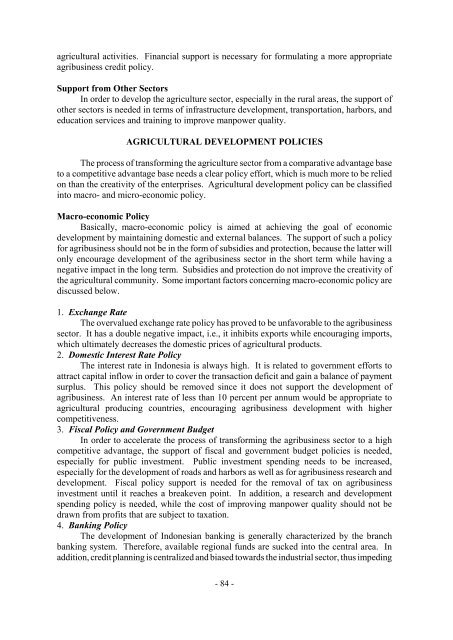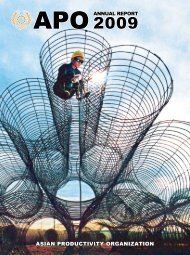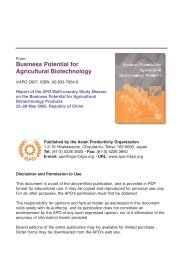Development of Agribusiness Enterprises - Asian Productivity ...
Development of Agribusiness Enterprises - Asian Productivity ...
Development of Agribusiness Enterprises - Asian Productivity ...
You also want an ePaper? Increase the reach of your titles
YUMPU automatically turns print PDFs into web optimized ePapers that Google loves.
agricultural activities. Financial support is necessary for formulating a more appropriate<br />
agribusiness credit policy.<br />
Support from Other Sectors<br />
In order to develop the agriculture sector, especially in the rural areas, the support <strong>of</strong><br />
other sectors is needed in terms <strong>of</strong> infrastructure development, transportation, harbors, and<br />
education services and training to improve manpower quality.<br />
AGRICULTURAL DEVELOPMENT POLICIES<br />
The process <strong>of</strong> transforming the agriculture sector from a comparative advantage base<br />
to a competitive advantage base needs a clear policy effort, which is much more to be relied<br />
on than the creativity <strong>of</strong> the enterprises. Agricultural development policy can be classified<br />
into macro- and micro-economic policy.<br />
Macro-economic Policy<br />
Basically, macro-economic policy is aimed at achieving the goal <strong>of</strong> economic<br />
development by maintaining domestic and external balances. The support <strong>of</strong> such a policy<br />
for agribusiness should not be in the form <strong>of</strong> subsidies and protection, because the latter will<br />
only encourage development <strong>of</strong> the agribusiness sector in the short term while having a<br />
negative impact in the long term. Subsidies and protection do not improve the creativity <strong>of</strong><br />
the agricultural community. Some important factors concerning macro-economic policy are<br />
discussed below.<br />
1. Exchange Rate<br />
The overvalued exchange rate policy has proved to be unfavorable to the agribusiness<br />
sector. It has a double negative impact, i.e., it inhibits exports while encouraging imports,<br />
which ultimately decreases the domestic prices <strong>of</strong> agricultural products.<br />
2. Domestic Interest Rate Policy<br />
The interest rate in Indonesia is always high. It is related to government efforts to<br />
attract capital inflow in order to cover the transaction deficit and gain a balance <strong>of</strong> payment<br />
surplus. This policy should be removed since it does not support the development <strong>of</strong><br />
agribusiness. An interest rate <strong>of</strong> less than 10 percent per annum would be appropriate to<br />
agricultural producing countries, encouraging agribusiness development with higher<br />
competitiveness.<br />
3. Fiscal Policy and Government Budget<br />
In order to accelerate the process <strong>of</strong> transforming the agribusiness sector to a high<br />
competitive advantage, the support <strong>of</strong> fiscal and government budget policies is needed,<br />
especially for public investment. Public investment spending needs to be increased,<br />
especially for the development <strong>of</strong> roads and harbors as well as for agribusiness research and<br />
development. Fiscal policy support is needed for the removal <strong>of</strong> tax on agribusiness<br />
investment until it reaches a breakeven point. In addition, a research and development<br />
spending policy is needed, while the cost <strong>of</strong> improving manpower quality should not be<br />
drawn from pr<strong>of</strong>its that are subject to taxation.<br />
4. Banking Policy<br />
The development <strong>of</strong> Indonesian banking is generally characterized by the branch<br />
banking system. Therefore, available regional funds are sucked into the central area. In<br />
addition, credit planning is centralized and biased towards the industrial sector, thus impeding<br />
- 84 -
















